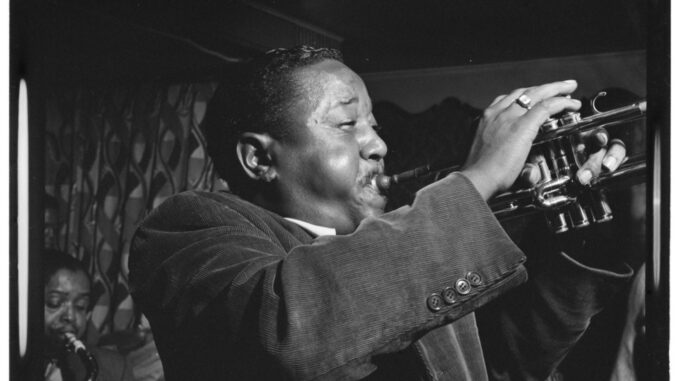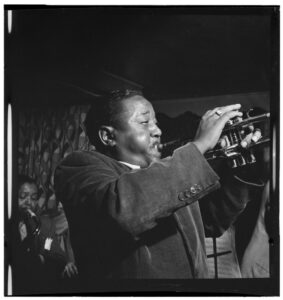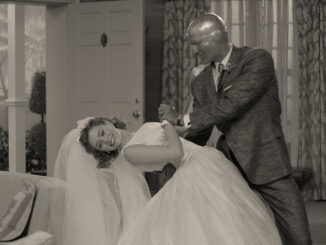
Emma Polen | staff writer
2/4/2021

Jazz musician Roy Eldridge was featured in last week’s virtual record-listening
Get ready to groove to some jazz from across the ages! Thomas Wendt, a professor at Duquesne’s school of music, is now sharing his expansive collection of jazz records and related knowledge, and everyone with a Duquesne email is invited to his listening sessions. His premiere Zoom this past Friday, Jan. 29, was based on the works of the musician Roy Eldridge.
Wendt discovered his passion for jazz as a drummer. He said he started listening to jazz in order to better his own rhythm section skills.
“As a musician, you’re always trying to grow and become better,” Wendt said.
Wendt hopes to encourage this same growth in Duquesne students, especially those interested in jazz music, with his Zoom sessions.
“The best way to [get closer to music] is to listen,” Wendt said. “By learning to listen in a critical, focused way, you can gain a much greater understanding of the music. And, it’s also fun.”
Last week’s jazz listening session started out with an introduction on Roy Eldridge, who was a jazz trumpeter from Pittsburgh. His debut album was published in the 1930s, but he was a popular player until his death in 1989. Eldridge played a major part in transforming the jazz trumpet from the style of Louis Armstrong to how it is heard in more modern jazz.
The first piece Wendt played on his record player for listeners was “(Lookie, lookie, lookie) Here Comes Cookie,” a trumpet feature that proves how talented Eldridge was even at the beginning of his career in the mid-1930s. From there, Wendt introduced his audience to a number of other works featuring Eldridge. These included tracks that Eldridge played alongside popular jazz players Oscar Peterson, Quincey Jones and Dizzy Gillespie.
My favorite piece was “What a Little Moonlight Can Do,” which Eldridge performed with well- known singer Billie Holiday. It was an upbeat tune that made me just want to stomp my foot. Its jazzy groove and forward motion made it a very easy addition to my favorites on Spotify. The piece that I thought was the most memorable was “Rap Your Troubles In Dreams” by the Newport Rebels featuring Roy Eldridge. The song itself is pretty laid back, but it has a surprisingly impactful message. The record was recorded in protest to big record companies commercializing jazz in the 60s.
In addition to playing a multitude of records for his audience, Wendt included helpful context for each of the pieces. For example, he explained that string orchestras became a popular addition to jazz music in the 1940s, and then proved that Roy Eldridge could always fit his trumpet part seamlessly into the sound of the song with the track “Bass and Street Blues” with Spencer Williams.
As apparent to anyone who was on the Zoom last Friday, Wendt is an avid record collector. He has shelves of record disks from assorted periods of music, proving that he takes the whole “listening” aspect of learning music seriously.
Wendt says he has had success finding records across Pittsburgh at places like Jerry’s Records, The Attic Records and The Government Center. Although last week was solely focused on Roy Eldridge’s career, Wendt had no shortage of records to play, and he filled almost the whole two hours of the Zoom session with Eldridge’s fantastic recordings.
Wendt encourages music students to join his Friday Zooms, but all Duquesne students are welcome. I would suggest joining at least once, if only to see Wendt’s impressive collection of records.
Tune in next Friday from 3 to 5 p.m. to enjoy the music of Dexter Gordon, a phenomenal jazz tenor saxophonist. In the weeks to come, Wendt will be featuring other jazz musicians from Pittsburgh and other jazz groups from history in future Zoom sessions.



